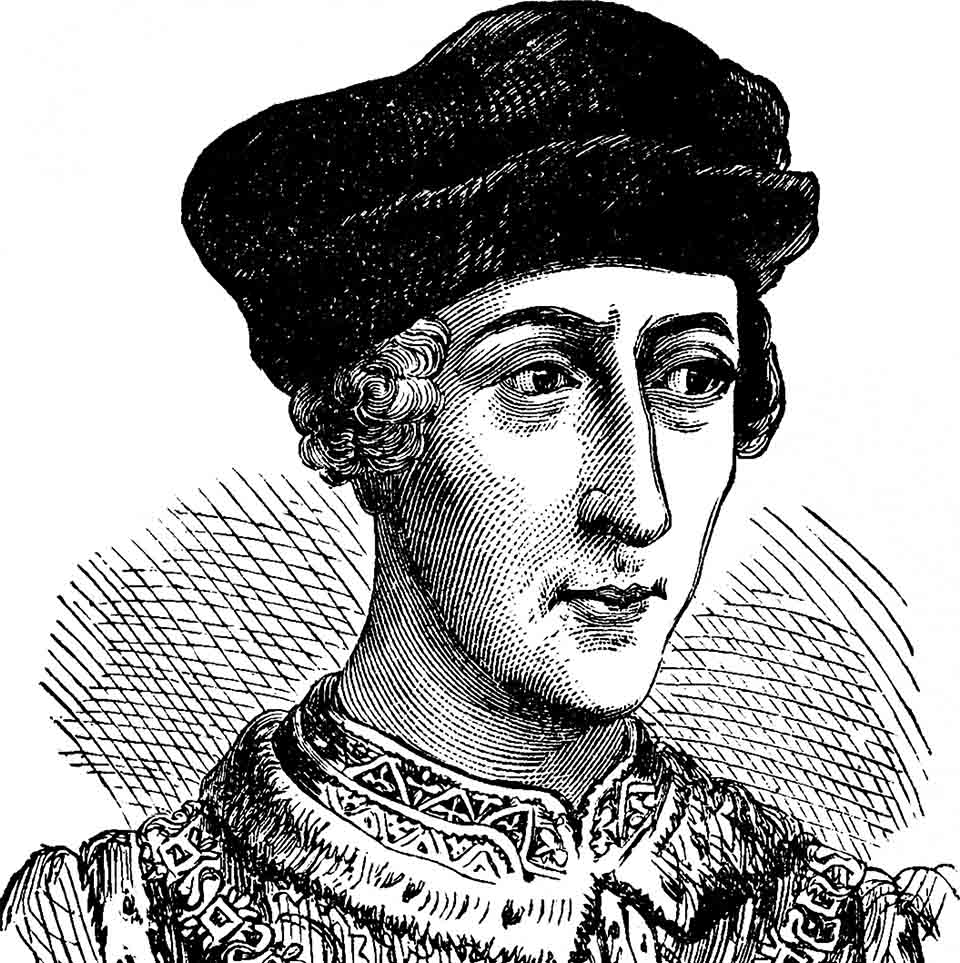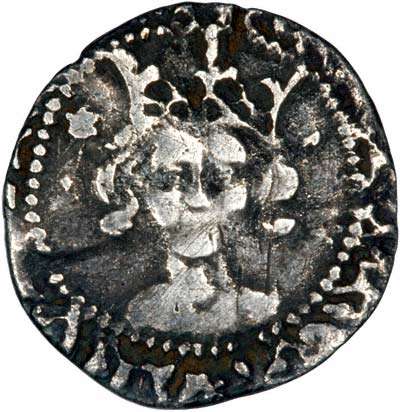King Henry V (1413 - 1422)
Synopsis
Henry V is one of the most famous Kings in English history, immortalised in Shakespeare's famous play of the same name as a warrior king who defeated a numerically superior army against huge odds at Agincourt, and who came within an ace of taking the throne of France. However, amongst historians, his reputation is mixed, as some of his actions, on and off the battlefield, demonstrate that there was darker side to the man considered one of England's greatest heroes.

Early Life
Born to Henry Bolingbroke (later Henry IV) and his teenaged wife, Mary de Bohun in either 1486 or 1487, Henry was not directly in the line of succession, as his father was merely a cousin of the King, and not a direct relation. His father was not on the best of terms with the King. In or around the year the future Henry V was born, Bolingbroke participated in the Lords Appellant Rebellion, which Richard II managed to crush, leading to the execution or exile of many of its leaders. Although Bolingbroke was forgiven by Richard II on this occasion, he felt it wise to spend many of the succeeding years away from England crusading against pagans in Lithuania and undertaking a pilgrimage to Jeruselum whilst his son remained behind in England.
In 1398, Bolingbroke made a remark that was interpreted by a rival as treason, to which the King's response was to exile Bolingbroke and take his son into custody. Henry thus spent a year in the company of the King. Perhaps because John of Gaunt, Duke of Lancaster, father of Bolingbroke and grandfather of Henry was a staunch supporter of Richard II, the King treated him well and allowed him to serve him as a retainer whilst they visited Ireland.
In 1399 however, John of Gaunt died, and Richard II decided to strip Bolingbroke of his inheritance as Duke of Lancaster. Bolingbroke however, returned to England to claim his inheritance, and with Richard II in Ireland, was able to effectively seize control of England, compelling Richard II to surrender to him and return the young Henry to his custody. Bolingbroke subsequently usurped Richard II, taking the throne for himself as Henry IV and then having the deposed King murdered.
Life as Prince of Wales
At his father's coronation in 1400, Henry was not only Prince of Wales, but also Duke of Lancaster in his own right (the new King had decided to allow his father's title to skip a generation and go straight to his son). Henry's father faced rebellions from the outset of his reign, and the teenaged Prince of Wales served his father by leading his own forces against Owen Glendower and Sir Henry Percy (Harry Hotspur). During the Battle of Shrewsbury, which was fought to prevent Hotspur joining forces with Glendower, Henry was wounded in the face by an arrow. Henry would normally have expected to die from such a wound in the days before the advent of modern medicine, but the skilled medical treatment of the King's physician saved his life, albeit with a scar which was to stay with him for the rest of his life, but which had the benefit of attesting to his experience and bravery in battle to those whom he would later lead.
Henry remained in Wales fighting against Glendower's rebellion until 1408, when his father's health started to decline and he returned to England to assume greater responsibilities in the governance of the realm. As his father's health deteriorated further still, he, along with his uncles, Henry and Thomas Beaufort effectively governed England in his father's name, although Henry IV did periodically counter his son's policies when his health permitted. In 1413, Henry IV died, and the Prince succeeded to the throne as Henry V.
Securing the English Throne
Early on in his reign, Henry V was determined to avoid the unrest at home that had plagued his father's reign; he achieved this through a combination of conciliation and ruthlessness. He re-interred the deposed Richard II at Westminster Abbey with all the honours due to a deceased king, and gradually restored the lands confiscated from his father's opponents. He offered full pardons to most of the Welsh rebel leaders of Glendower's revolt, including Glendower himself, although the welsh leader had been in hiding since 1412 and was never seen again.
However, Henry was not averse to using the stick as well as the carrot when quelling opposition to his rule. He executed many of the Lollards and their allies who had been involved in the Southampton Plot to assassinate him and put Edmund Mortimer, 5th Earl of March on the throne in 1415, just as Henry was about to embark for France. However, it was Mortimer himself who revealed the plot, and although he had a genealogically superior claim to the throne (he had been Richard II's heir presumptive before Henry IV's coup), he would fight alongside Henry V in France and remained loyal to the House of Lancaster for the rest of his life. Henry V's old friend Sir John Hardcastle (the model for Falstaff in Shakespeare's play) was later executed in 1417 however, for his part in the Lollard conspiracies against him.
All in all, Henry V's policies of pacifying England were successful, and Henry V never faced a serious uprising at home as his father had on more than one occasion. Henry did not want to get bogged down in quelling revolts in England, because this would have distracted him from his desire to assert his claim to the throne of France.
Once More into the Breach My Friends…
The Kings of England had claimed the throne of France since the time of Edward III, but the claim had largely been on the backburner since a truce had been signed with France in 1389. Henry IV had made plans to renew the conflict, but had died before they could be carried out. With the nobility at home largely pacified, Henry V was now determined to reassert the English claims to the French Throne and so, in 1415, he sailed for France, and into the history books…
Having arrived in France in August 1415, Henry besieged Harfleur, a port town. Unfortunately for Henry, the town took longer than expected to take, and did not fall until September the 22nd. With the end of the campaigning season nearly over (armies of the period tended not to move and fight in the winter) , Henry decided that he had to take his army, minus the garrison installed in Harfleur, to Calais so that he could return to England for the Winter. The French thought that this was a golden opportunity to intercept and destroy Henry V's army before it could reach Calais and safety, and succeeded in doing so near the village of Agincourt on the 24th of October, 1415. Henry's army was thus trapped, unable to reach Calais, and suffering heavily from dysentery and exhaustion, whilst the vastly numerically superior French force was fresh and in better condition. Whilst the French were awaiting further reinforcements the following day, Henry decided to provoke the French into attacking by moving his archers forward into range. The tactic worked, and the French charged forwards to be slaughtered by English longbowmen, many French troops were killed or captured by the English, including many important French nobles. It was during the battle that one of the most controversial incidents of Henry's reign took place, when he ordered that those prisoners captured in the initial waves of French attacks be put to death to prevent them joining the later attacking waves and thus overwhelm the English. However, contemporaries did not view this event as an atrocity, even on the French side. By the standards of the day, the murdering of captured prisoners was not considered especially crue, although it was slightly unusual for captured nobles to be killed, common soldiers whose families could not afford to pay a ransom could usually expect to be killed on the spot as a matter of course!
In any event, the outcome of the battle was a great success for Henry. He had cemented the position of himself and the Lancastrian dynasty, as well as the English position in France, and had killed or captured a large portion of the French nobility, leaving France in disarray and short of effective leadership for the time being. Further campaigns saw the capture of Caen in 1417 and Rouen in 1419, and it was agreed by the King of France, Charles VI that Henry V would marry his daughter and become his heir to the throne of France, thus disinheriting Charles VI's own son, the Dauphin. Had Henry V outlived his father in law, there is every chance history might have taken an entirely different course. However, it was not to be. In 1422, Henry V died, followed 2 months later by Charles VI. Henry V's infant son, the 9 month old Henry VI, succeeded him to the throne of England, but without the dynamic leadership of Henry V, England was not in the position to enforce the English claim to the throne effectively.
Legacy

Henry V's achievements in his own lifetime were almost without parallel. He faced down revolt at home, even to the point of making an ally of the rival claimant to his Lancastrian crown, and in defeating France and having himself recognised as heir to the French throne. Had he lived for just one more year, he probably would have gone down in history as England's greatest ever monarch.
But it was not to be. Having left the throne in the hands of a mere infant, who grew up to be a weak and ineffectual monarch, most of Henry V's achievements were unravelled before the century was out. In 1453, the English were effectively driven from France, and Henry's son became embroiled in a conflict that would eventually lead to the loss of his crown and the destruction of the Lancastrian dynasty Henry V had done so much to secure.
A more lasting legacy however, was Henry's role in reviving the English language as the lingua franca in England itself. Despite his attempts to secure the French Throne, Henry V was the first English Monarch since the time of the Conquest in 1066 to use English in his personal correspondence with fellow Englishmen. Before then, English Kings and other English aristocrats had used French amongst themselves as their first language, and were to all intents and purposes, largely French themselves from a cultural point of view.
Numismatically, Henry V's reign is fairly unremarkable. However, as one of England's greatest and most famous monarchs, his coins do enjoy a popularity that would not otherwise be the case if he had been one of England's less renowned kings.
A history of Kings and Queens of England - Learn more about the Kings and Queens that reigned England throughout the different monarch dynasties (1066-2022).
Related Blog Articles
This guide and its content is copyright of Chard (1964) Ltd - © Chard (1964) Ltd 2024. All rights reserved. Any redistribution or reproduction of part or all of the contents in any form is prohibited.
We are not financial advisers and we would always recommend that you consult with one prior to making any investment decision.
You can read more about copyright or our advice disclaimer on these links.





















